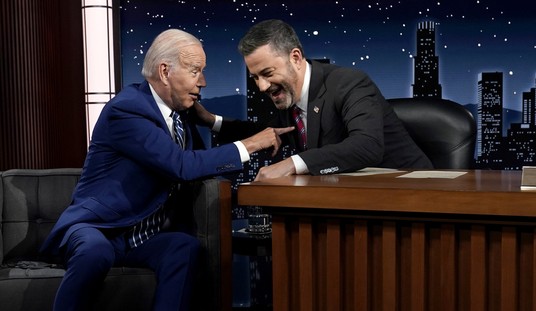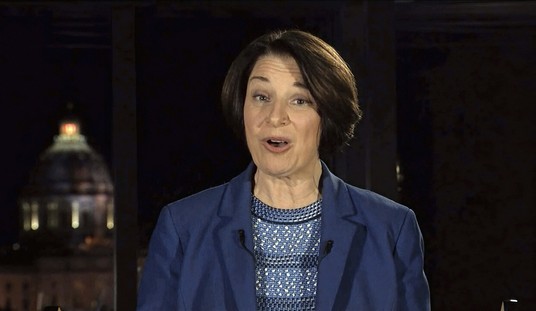That renewed focus is not just aspirational either, but operational. CBS News reports on a shadowy al-Qaeda unit working in Syria to find ways to attack American aviation, using Westerners who came to Syria and Iraq to fight with terror networks such as ISIS and Jabhat al-Nusra. Led by the bombmaker behind the Underwear Bomb and the cargo bombs of the last few years, US intelligence considers this group a more imminent threat to American security than ISIS at the moment:
At two dozen foreign airports, U.S.-bound passengers are undergoing enhanced security screening. Agents are searching for hidden explosives. Laptops and phones with dead batteries have been banned from flights.
Great Britain raised its national terror threat level, and the FBI is tracking American jihadists who may return home.Sources say it’s due to the emerging threat in Syria, where hardened terrorists loyal to al Qaeda leader Ayman al-Zawahri are working on new, hard-to-detect bombs.
In testimony Wednesday, the Director of the National Counterterrorism Center, Matt Olsen — who warned that U.S. agencies are unable to effectively track Western jihadists inside Syria — seemed to make a vague reference to the threat.
“In Syria, we’ve seen veteran al Qaeda fighters travel from Pakistan to take advantage of the permissive environment there,” said Olsen.
Sources confirm that the al Qaeda cell goes by the name “Khorasan.”
Unlike ISIS, which is believed at present to be largely engulfed in its fight for territory. Khorasan is developing fresh plots to target U.S. aviation, and it’s trying to recruit Westerners who have flocked to the fight in Syria, some of whom have joined the al Qaeda franchise in the country, known as the al-Nusra Front.
Allahpundit wrote about this same group on Monday, but as the video above shows, the topic arose in the House’s Homeland Security briefing yesterday. The effort isn’t as “quiet” as it was before, even with the US still preferring not to discuss it publicly. Jeh Johnson wouldn’t even reference the name of the group when advising members that this is a topic best left to classified briefings only. The whisperings have progressed somewhat, and as AP deduced, it may be to provide just enough of a context for bombing targets in Syria to keep opposition to the move muted when it happens.
This poses a larger question, though, about the fodder being produced in the West for terrorist cannons in the Middle East. The West seems to be losing the ideological war especially among younger people, a relative few of whom get seduced (almost literally) to the adept propaganda produced by ISIS and other terror networks over social media. The US has started to push back against the propaganda, but as SITE Intelligence Group director Rita Katz writes, the effort has been mostly disappointing, and occasionally counterproductive:
Thirteen years into the war on terror, it is distressing to see certain ways the U.S. government is combating domestic radicalization by groups like al-Qaeda (AQ) and the Islamic State (IS). Among the more embarrassing of these ventures is the “Think Again Turn Away” campaign, launched in English in December 2013 by the United States Department of State as part of an effort to enter the war of ideas and win over hearts and minds of jihadists on social media. (Earlier efforts began in Arabic and Urdu in 2011.) And while the State Department is making a great step in the right direction by recognizing the importance of social media in jihadi recruitment, the Think Again Turn Away campaign has been anything but valiant—particularly on Twitter. This outreach by the U.S. government is not only ineffective, but also provides jihadists with a stage to voice their arguments—regularly engaging in petty disputes with fighters and supporters of groups like IS (also known as ISIS), al-Qaeda and al-Shabaab, and arguing over who has killed more people while exchanging sarcastic quips. …
The State Department responded to an August 6 tweet by Amreeki Witness stating, “IS has flaws, but the moment you claim they cut off the heads of every non-Muslim they see, the discussion is over.” Though the discussion was not addressed to them, Think Again Turn Away replied, “#ISIS tortures, crucifies & shoots some- ISIS also gives ultimatums to Christians: convert, pay or die- Some flaws u say?”
Amreeki Witness, thrilled to be noticed by the U.S. Government, and given a stage on which to launch radical jihadist views toward Think Again Turn Away’s thousands of followers, provided a long series of rebuttals, some of which linking to form lengthy attacks. The Think Again Turn Away account, instead of ignoring the claims of a pro-IS jihadist, dignified them by responding, “#ISIS confiscated food, houses, stole millions from banks & has only brought suffering and death to innocents- Join reality!”
Of course, the State Department’s intent here is to hijack the audience of accounts like Amreeki Witness in order to address the moderate Muslims on the fence regarding jihad—their real target audience. However, these exchanges, as illustrated by the overwhelming response from Amreeki Witness as compared to that of Think Again Turn Away, frequently backfire by providing jihadists legitimacy and a stage on which to project their messages.
We seem to have forgotten the lessons we learned while winning a decades-long ideological war against the Soviet Union, I write today at The Fiscal Times. One of the most important lessons for us to relearn is to stop punching down:
It gets worse. An Australian leader within Jabhat al-Nusra, an al-Qaeda affiliate, celebrated the anniversary of 9/11 with a tweet noting that “the idol of capitalism” had been destroyed “on this day, in 2001.” The State Department responded to that by pointing out that ISIS “caliph” Abu Bakr al-Baghdadi owns a Rolex. Katz reminds readers that the Nusra Front and ISIS are rivals, not allies, and that “the irony is ugly” in engaging in dialogue with an AQ-affiliated terrorist leader on the anniversary of 9/11. That, Katz argues, “provide[s] legitimization to the account of the same people who committed the attacks.”
In the political world, that practice is called “punching down.” In the practice of ideological struggles of the past, it would be the equivalent of offering a podium to a Baader-Meinhof operative at a State Department briefing. Undoubtedly, the State Department will offer more rational arguments and win the debate, but the debate itself elevates the radical fringe to equality with the norm. It gives the ideological foes of rationality and humanitarian systems equal status – and that will only encourage more recruitment and more effective fundraising for ISIS and other terrorist networks.
The West needs to win the propaganda war against ISIS and other such groups, but we have to relearn the lessons of past age in doing so. Liberty and freedom will win the argument in the long run, but only if we ensure that our ideological framework keeps the dangerous fringe where it belongs, rather than legitimize them into the mainstream that they want to dominate. Silence is not an option, but neither should be handing our enemies megaphones.
Nevertheless, the State Department is correct to launch its own ideological battle on behalf of Western values, one in which highlights the brutal truth of our enemies. That is a battleground we cannot afford to concede, and one that involves the necessary winning of hearts and minds both at home and abroad. We must deny AQ, Khorasan, and ISIS the ability to make our children their cannon fodder.








Join the conversation as a VIP Member